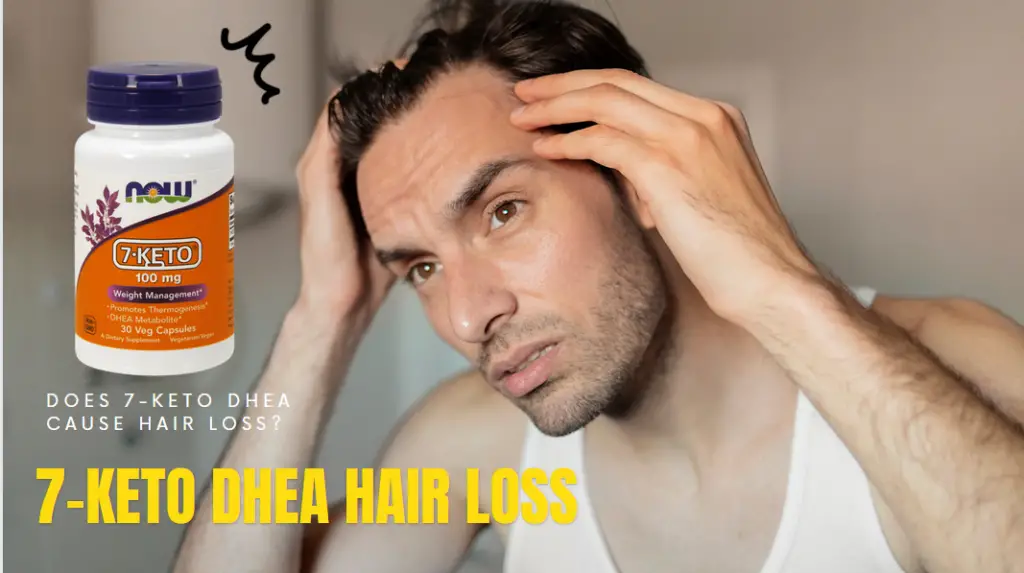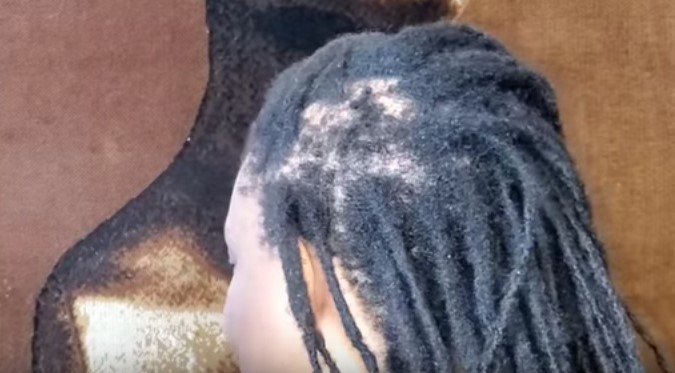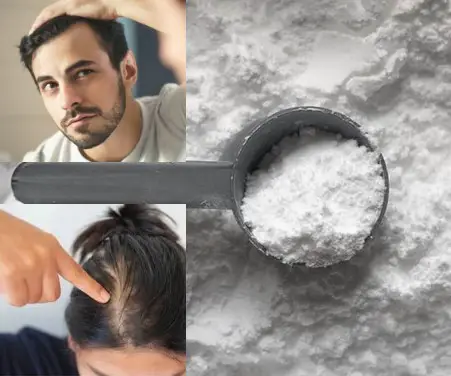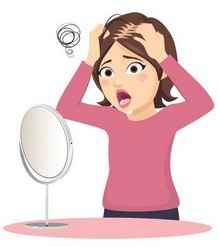If you’re asking yourself whether 7-keto DHEA hair loss is a genuine concern, the answer is yes. DHEA, or Dehydroepiandrosterone, is a hormone that has been associated with hair loss in some studies. 7-keto DHEA is a form of DHEA, and it’s been linked to hair loss in people who take the supplement. In this blog post, we’ll discuss the possible causes of 7-keto DHEA hair loss and what you can do to protect your hair.
What is 7-Keto DHEA?
7-Keto DHEA, also known as 7-oxoprasterone, a by-product of 7-keto-DHEA is Dehydroepiandrosterone, which is a natural hormone that can be found in the human body. It is an endogenous form of Dehydroepiandrosterone (DHEA) and has similar properties, although it is produced in lower quantities than DHEA. 7-Keto DHEA is often used as a dietary supplement to support weight loss and boost the immune system.
Many people take 7-Keto DHEA in the form of supplements to promote health benefits, such as increased energy, improved memory, and weight loss. Some studies suggest that 7-Keto DHEA can be beneficial for hair loss, although the evidence still needs to be more conclusive.
While there is not yet enough research to determine whether or not 7-Keto DHEA can cause hair loss, some experts believe that high levels of 7-Keto DHEA may be linked to certain hair problems. There have been reports of people who experienced hair thinning or shedding after taking 7-Keto DHEA supplements, although more studies are needed to confirm this link.
Additionally, some studies have suggested that high levels of DHEA could lead to hair loss in women with elevated testosterone levels, as well as hair loss in those with high levels of pregnenolone.
Finally, there is some evidence that high levels of DHEA can lead to eyelash loss, which may be reversible with topical treatment.
Overall, the evidence on whether or not 7-Keto DHEA can cause hair loss is inconclusive at best. It is important to discuss any potential risks with a healthcare professional before taking any supplement.
How Does 7-Keto DHEA Work?
You have already known, that 7-Keto DHEA is a supplement made from the hormone dehydroepiandrosterone (DHEA). It is produced naturally in the body and serves as a precursor for other hormones, including testosterone and estrogen. 7-Keto DHEA works by activating a process known as ketogenesis, which increases the body’s production of ketones, a type of fuel that is essential for energy production. This process boosts energy levels and enhances performance.
It’s important to note that while 7-Keto DHEA is an effective supplement, it should not be taken as a replacement for regular exercise and healthy eating. Additionally, it should not be used to treat any medical condition.
When it comes to hair loss, there have been some studies done on 7-Keto DHEA and its potential to cause hair loss. However, the results of these studies have been inconclusive and more research is needed to definitively answer whether 7-Keto DHEA can cause hair loss.
Additionally, it’s worth noting that high levels of DHEA can lead to high testosterone in women, which can result in hair loss.
In addition to this, there is also some evidence that suggests that topical dehydroepiandrosterone scalp may be beneficial for treating hair loss. Similarly, there have been some studies done on whether human growth hormone (HGH) has any effect on hair loss, but again, these studies have yet to be conclusive.
The bottom line is that more research needs to be done in order to definitively answer whether 7-Keto DHEA can cause hair loss. Until then, it’s best to talk to your doctor about your specific situation before starting any supplements or treatments for hair loss.
What Are The Benefits of 7-Keto DHEA?
7-Keto DHEA (Dehydroepiandrosterone) is a hormone that is produced in the body and is believed to have beneficial effects on ageing, skin health, depression, infertility, muscle strength, heart disease, and erectile dysfunction. Research has found that 7-Keto DHEA may improve the appearance of ageing skin, reduce age spots, and even aid in fighting symptoms of schizophrenia in women. Additionally, 7-Keto DHEA may help fight the symptoms of lupus and increase bone density in older women.

It is important to note that while 7-Keto DHEA may offer many health benefits, it can also have adverse side effects and interact with certain prescription drugs. Moreover, there is some evidence that taking 7-Keto DHEA may increase the chance of developing certain types of cancer. It is always best to speak to a healthcare professional before beginning any supplement or changing your diet.
As far as hair loss goes, there is limited evidence to suggest that 7-Keto DHEA can cause hair loss or affect hair growth. In fact, some studies have recommended that high levels of DHEA can cause hair loss in both men and women. It is essential to note that there is no conclusive evidence to submit that keto supplements can cause hair loss. However, high levels of DHEA could lead to hair loss in some individuals.
Additionally, some research suggests that topical Dehydroepiandrosterone (DHEA) on the scalp can help reduce hair loss, though more research is needed in this area.
Finally, it is also important to consider that high levels of hormones such as testosterone and DHEA can sometimes lead to eyelash loss in women. Additionally, high levels of human growth hormone (HGH) could potentially lead to hair loss in some individuals as well. As always, it is best to speak to a qualified healthcare provider before starting any new supplement or hormone therapy.
So, Does 7-Keto DHEA Cause Hair Loss?
Hair loss is a common issue for men, and there are various causes, one of which is a hormone called dihydrotestosterone (DHT). DHT is created when the body combines an enzyme called 5-alpha reductase (5AR) with testosterone. All men create DHT, but only those with a specific gene will develop androgenetic alopecia, a type of hair loss caused by DHT.
When it comes to 7-Keto DHEA and its effect on hair loss, the evidence is not conclusive. It is unclear if 7-Keto DHEA causes an increase in testosterone production and, thus, an increase in DHT, as studies have yet to find a definitive answer to this question.
However, human growth hormone (HGH) has been proven to cause an increase in testosterone. For men who have a genetic predisposition for hair loss, HGH can accelerate hair loss. So it stands to reason that if 7-Keto DHEA does produce extra testosterone, then it can also worsen hair loss in men with the gene for androgenetic alopecia.

Therefore, if you are prone to hair loss due to androgenetic alopecia or if you take keto supplements, it is important to consider the potential side effects, such as hair loss. It is advisable to speak to a healthcare professional before taking any form of 7-Keto DHEA or any other dietary supplement to determine whether or not it is right for you.
Potential Risks of Taking 7-Keto DHEA
While 7-Keto DHEA is a natural hormone found in the body, taking it in supplement form can still have potential risks. High levels of DHEA can lead to high testosterone in women, which can result in hair loss, as well as other side effects such as acne and facial hair growth. Additionally, 7-Keto DHEA can also have an effect on hormones such as estrogen and progesterone, which may lead to other side effects.
It is also worth noting that 7-Keto DHEA is not recommended for certain individuals, such as pregnant or breastfeeding women, those with a history of breast cancer or other hormone-sensitive conditions, and those taking certain medications. It is always best to consult with a healthcare professional before starting any supplement, especially if you have any underlying health conditions.
Using Propecia to Offset Hair Loss Caused by DHEA
When it comes to finding a balance between the potential benefits of 7-keto DHEA and its potential for causing hair loss, it cannot be easy. One strategy that some men turn to is using prescription drugs like Finasteride (tradename Propecia or Proscar) and Dutasteride (tradename Avodart) to try to offset the effects of 7-keto DHEA on their hair.
These drugs work by blocking DHT, which is the hormone responsible for hair loss in people with androgenetic alopecia. While this may seem like a good idea in theory, it can take time to determine how to balance the two drugs accurately. And unfortunately, there is no clear answer when it comes to how much either drug will help to counteract hair loss caused by 7-keto DHEA.
Although research suggests that taking these drugs may help reduce hair loss caused by keto supplements or high testosterone and DHEA in women, there is not enough evidence to suggest that these medications will completely reverse any hair loss caused by 7-keto DHEA or other hormones like pregnenolone or HGH.
Other treatments, such as topical dehydroepiandrosterone scalp treatments, may also have a positive effect on reversing hair loss from 7-keto DHEA, but more research needs to be done before any definitive conclusions can be made.
Ultimately, if you are looking for a way to offset the potential for 7-keto DHEA to cause hair loss, talking to your doctor about the use of Finasteride or Dutasteride may be a good option to explore. However, it is important to keep in mind that these drugs may not completely reverse any hair loss you may experience while taking 7-keto DHEA or any other hormone-influencing drugs.
7 Keto-DHEA as an Alternative for DHEA
Because of fears that DHEA could cause hair loss in men, a metabolite of DHEA called 7-Keto DHEA was made.
People think that 7 Keto DHEA has most of the known benefits of DHEA without breaking it down into oestrogen and testosterone and causing hair loss.
The Bottom Line
Overall, 7-Keto DHEA is a beneficial supplement that can provide numerous health benefits. However, it’s important to consider the potential side effects when taking this supplement. While there is not enough evidence to conclusively prove that 7-Keto DHEA can cause hair loss, some people may experience a decrease in their hair growth and density when taking this supplement.
In some cases, hair loss caused by DHEA may be reversible with the proper treatment. If you are worried about potential hair loss from 7-Keto DHEA, it may be beneficial to talk to your doctor about using Propecia as an offsetting measure. Additionally, research into other supplements, such as keto supplements for nutrient deficiencies and topical Dehydroepiandrosterone scalp treatments, may help reduce the risk of hair loss. Finally, be aware that high levels of DHEA and testosterone in women may cause eyelash loss, so talk to your doctor if you have any concerns.
7-Keto-DHEA Hair Loss FAQ
What are the side effects of 7-keto-DHEA?
Can DHEA supplements cause hair loss?
Is hair loss from DHEA reversible?
Does DHEA increase hair growth?
What are the negative effects of DHEA?
Who should not take DHEA?
What are the symptoms of too much DHEA?
What are the side effects of Keto supplements?
DHEA Resources
- WebMD.com & DHEA
- Council For Responsible Nutrition DHEA: The Basic Details
- This research has raised fears about the effects of DHEA on the prostate gland: “Pharmacokinetics of dehydroepiandrosterone and its metabolites after long-term daily oral administration to healthy young men.”
- Supplements for hormones used by athletes (DHEA) might not increase testosterone levels.
- The latest studies (2012) indicate that DHEA can help ease menopausal symptoms in women.
- AI Powered Bald Filter Online 2024: See Yourself with No Hair! - January 19, 2024
- Harklinikken Bad Reviews 2024: Analyzing Negative Feedbacks - January 18, 2024
- How to Get the Alex Eubank Hair | Step-By-Step Tutorial 2024 - January 18, 2024







